No edit summary |
TR (Message Wall | contribs) |
||
| Line 565: | Line 565: | ||
==='''Washington, DC is NOT the U.S. Capital'''=== |
==='''Washington, DC is NOT the U.S. Capital'''=== |
||
[[File:WhiteHouse.jpg|thumb|left|The [[White House]], along with the rest of [[Washington, D.C.]], has been destroyed by an [[atomic bomb]] at least thrice.]]For one reason or another, [[Washington, DC]] is rarely the capital of the [[United States]] in Turtledove's fiction after the [[point of departure]]. Usually, this is because DC was destroyed by an [[atomic bomb]]. In [[The Hot War]], the capital moves to [[Philadelphia (The Hot War)|Philadelphia]] after DC is destroyed by the [[Soviet Union (The Hot War)|Soviet Union]] during the [[World War III (The Hot War)|Third World War]] in May 1952. In [[In the Presence of Mine Enemies (novel)|''In the Presence of Mine Enemies'']], the capital was moved to [[Omaha (In the Presence of Mine Enemies)|Omaha, Nebraska]] after DC was destroyed by [[germany (In the Presence of Mine Enemies)|Nazi Germany]] in another [[Third World War (In the Presence of Mine Enemies)|Third World War]]. In [[Colonization]], the capital is moved to [[Little Rock (Worldwar)|Little Rock]], [[Arkansas (Worldwar)|Arkansas]] after DC was destroyed by [[the Race]] during [[Race Invasion of Tosev 3|the alien invasion]]. In [[Southern Victory]], [[Philadelphia (Southern Victory)|Philadelphia]] becomes the ''de facto'' capital (although Washington remains the ''de jure'' capital), due to Washington's proximity to the ever-dangerous [[Confederate States (Southern Victory)|Confederate States]]. In "[[Vilcabamba]]", [[Grand Junction (Vilcabamba)|Grand Junction]], [[Colorado (Vilcabamba)|Colorado]] is the ''de facto'' capital, as Washington (along with at least 75% of the [[OTL]] United States) is occupied by the [[Krolp]]. |
[[File:WhiteHouse.jpg|thumb|left|The [[White House]], along with the rest of [[Washington, D.C.]], has been destroyed by an [[atomic bomb]] at least thrice.]]For one reason or another, [[Washington, DC]] is rarely the capital of the [[United States]] in Turtledove's fiction after the [[point of departure]]. Usually, this is because DC was destroyed by an [[atomic bomb]]. In [[The Hot War]], the capital moves to [[Philadelphia (The Hot War)|Philadelphia]] after DC is destroyed by the [[Soviet Union (The Hot War)|Soviet Union]] during the [[World War III (The Hot War)|Third World War]] in May 1952. In [[In the Presence of Mine Enemies (novel)|''In the Presence of Mine Enemies'']], the capital was moved to [[Omaha (In the Presence of Mine Enemies)|Omaha, Nebraska]] after DC was destroyed by [[germany (In the Presence of Mine Enemies)|Nazi Germany]] in another [[Third World War (In the Presence of Mine Enemies)|Third World War]]. In [[Colonization]], the capital is moved to [[Little Rock (Worldwar)|Little Rock]], [[Arkansas (Worldwar)|Arkansas]] after DC was destroyed by [[the Race]] during [[Race Invasion of Tosev 3|the alien invasion]]. In [[Southern Victory]], [[Philadelphia (Southern Victory)|Philadelphia]] becomes the ''de facto'' capital (although Washington remains the ''de jure'' capital), due to Washington's proximity to the ever-dangerous [[Confederate States (Southern Victory)|Confederate States]]. In "[[Vilcabamba]]", [[Grand Junction (Vilcabamba)|Grand Junction]], [[Colorado (Vilcabamba)|Colorado]] is the ''de facto'' capital, as Washington (along with at least 75% of the [[OTL]] United States) is occupied by the [[Krolp]]. |
||
| + | |||
| + | ===West Coast Country of America=== |
||
| + | In a number of works, Turtledove has the [[United States of America|U.S.]] states of [[California]], [[Oregon]] and [[Washington]] secede from the Union and form their own country. |
||
| + | |||
| + | In "[[The Breaking of Nations]]", Turtledove's contribution to the shared work anthology ''After the Last Trump Sounds'', the three states form the country of [[Pacifica]] in 2031 in response to the authoritarian [[President of the United States|presidency]] of [[Mike Pence]]. The story depicts the secession and the early days of Pacifica. |
||
| + | |||
| + | The [[alternate History]] short story "[[Powerless]]" is set in the [[West Coast People's Democratic Republic]], a [[communist]] country modeled on the [[Soviet Union]]. While the USSR plainly prevailed in the [[Cold War]], the history of the WCPDR isn't described in detail. |
||
| + | |||
| + | In "[[Manuscript Tradition]]", a science fiction story set in the year 2219, [[West Coast]] shares icy relations with the U.S. Its history is not examined. |
||
==='''The World Turned Upside Down'''=== |
==='''The World Turned Upside Down'''=== |
||
Revision as of 18:43, 26 September 2020
Because Harry Turtledove often writes alternate histories set in roughly the same time periods, or that address many of the same themes, certain specific ideas often turn up as plot-points in separate timelines.
People
Al-Ghazali versus Aquinas
Al-Ghazali (11th and 12th century Persian) and Thomas Aquinas (13th-century Italian) were mildly influential philosophers in their cultures. They were not contemporary to each other, and neither was irreplaceable within their respective philosophy genres. Nonetheless, two Turtledove scenarios imply that these two men represented polar opposite viewpoints, and that the destiny of all Western civilization hinges on which one's philosophy is generally adopted. This is briefly referenced in In High Places, and referenced much more often in Through Darkest Europe.
Aliens get stoned
Some alien races in Turtledove's science fiction are susceptible to the narcotic effects of roots which grow from the ground. In A World of Difference, Minervans are susceptible to the Ompass root. In Worldwar, the Race's vulnerability to the common ginger plant of Tosev 3 is an important part of the series' plot. In "Vilcabamba," the Krolp are similarly affected by Snarfar.
Americans in a Provincial town of the Roman Empire
Household Gods and Gunpowder Empire start from different premises – in the one case time travel to the historical Roman Empire, in the other a "sidewise" travel to an alternate timeline where the Roman Empire survived to the present day. The two resulting stories have, however, very many similar plot elements. In both cases, it is essentially the story of modern American(s) living clandestinely in a provincial Roman city, having a perfect knowledge of Latin which in itself does not impart a complete understanding of the nuances of Roman society; facing the daunting prospect of being irrevocably marooned in the Roman milieu and deprived of many things conceived of as indispensable amenities; needing to deal with the prevalent institution of slavery in general and establishing a personal relationship with one individual slave (a female in both cases), in both cases ending with setting her free; being caught in a dangerous invasion from beyond the imperial boundaries and consequently developing willy-nilly a strong partisanship and a fervent hope for the victory of the Roman Legions.
Also, "Death in Vesunna" is the story of two 21st-century criminals who travel to 2nd-century Gaul to plunder literary treasures. While the villains' nationality is never stated to be American, it is highly likely to be so.
Auchinleck vs. Model
In OTL, British General Claude Auchinleck and German General Walther Model never faced each other during World War II; the former fought primarily in the Middle East and North Africa, while the latter fought primarily in the Soviet Union.
In the works of Harry Turtledove, Auchinleck and Model have faced each other not once, but twice. The first time came in the short story "The Last Article", wherein Auchinleck fights a doomed guerrilla war against the invading Model in India into 1947. The second time came in The War That Came Early: Two Fronts, where Model, as commander of Afrika Korps, (rather than Erwin Rommel, who is never mentioned in the series) meets Auchinleck in North Africa in 1943. Nothing really comes of the latter face-off.
The Babe Always Calls his Shot
Babe Ruth's legendary called homerun from the 1932 World Series is fondly remembered, but actually shrouded in mystery (did he actually mean to call his home run, or was his dramatic pointing something else). In the works of Harry Turtledove, Ruth undeniably calls his shot. In "Before the Beginning", the time-viewer confirms that Ruth indeed was calling his shot. In "The House That George Built", Ruth, a minor leaguer, calls his shot while playing for Baltimore Orioles in the early 1920s. In The Disunited States of America, one "George Herman" (whose name is like the Babe's real name, except for being "ruthless") called his shot while playing a game of rounders.
Baseball players with (vampire) bats
In both "Batboy" and The House of Daniel, young men from early-20th-century American backwaters join traveling baseball teams and encounter vampires. As a further connection, both works are narrated in the first-person, rather than Turtledove's customary third-person.
Benjamin Butler Sucks!
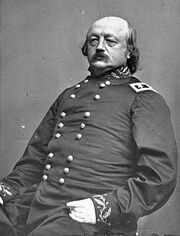
Benjamin Butler asks: "Why does everyone hate me?"
While this bias is probably borne out by the historical record, Turtledove works the idea that Union General and onetime military governor Benjamin Butler was a slimeball (at least from a Confederate perspective) into three works. In The Guns of the South, Robert E. Lee and his colleagues revile Butler. In How Few Remain, Abraham Lincoln has few kind thoughts about Butler. In "Must and Shall", Neil Michaels views a statue of Butler, concluding that Butler was an unlikely choice for such an honor.
Border guard, soldiers enforcing annexation
Both Southern Victory's opening volume How Few Remain and Darkness' opening volume Into the Darkness have a scene early in the book where soldiers (Confederates in the one case, Algarvians in the other) arrive to enforce the recent annexation of a territory to their country (Chihuahua and Sonora/Bari) and talk with a border guard who is engaged in taking down the former ruler's flag. However, the scene which began very similarly in the two books ends in a diametrically opposite way - the Mexican border guard, unhappy with the diminution of his country but resigned to it, carefully folds the flag of Mexico, to be taken back to what is left of the country; the Barian border guard, enthusiastic to be reunited with Algarve, contemptuously drops to the ground the flag of the Duchy of Bari, which had ceased to exist. Regardless of this difference, in both books the annexation itself is achieved bloodlessly but provokes a war (Second Mexican War/Derlavaian War).
The Butler Did It!
At one point in each story, both Southern Victory and Atlantis are set in agrarian societies which have reproduced the slave labor-fueled plantation-based economic system of the antebellum South, as well as the social systems which buttressed it. In Southern Victory, the Confederate victories in the War of Secession and Second Mexican War ensured that the system was able to endure into the early 20th century. Though the CS abolished slavery in the 1880s, its rigid racial hierarchy left Negro Southerners with few economic opportunities aside from working at jobs once filled by slave labor, under conditions quite similar to those found on slave labor-fueled plantations. Meanwhile, at the outset of Liberating Atlantis, the Antebellum South's slave-based economy has been translated to the lower states of the United States of Atlantis in the early 19th century, in keeping with the series' ongoing theme of parallelism between American and Atlantean history.
Liberating Atlantis and American Front each introduce us to a character, Frederick Radcliff and Scipio respectively, both use a rather unique position in black society to destroy the plantation system. Both are majordomos of large estates and live lives of relative privilege within the limitations imposed upon the black subsociety, being allowed to occupy themselves with domestic rather than farm labor, and eventually being entrusted with authority over other servants. Both contentedly served their masters throughout their youth, becoming well educated by black standards, though each obtained his education at white sufferance and for white purposes rather than for his own edification.
In middle age, a series of serendipitous events lead both men to become involved in rebellions which will fundamentally reorder their societies. Scipio discovers that some of his fellow servants are well on their way to rising up in armed rebellion and, despite reservations, elects to join them rather than betray them to Anne Colleton, those being the only two options available to him. Frederick Radcliff spontaneously murders an overseer and finds himself thrust, unexpectedly but willingly, into the leadership role of the Atlantean Servile Insurrection.
Both men find themselves briefly occupying leadership positions in the short-lived self-declared breakaway governments under whose flag their followers fight, then eventually become reintegrated into the nations which had originally been their homes, though with a permanently changed and (temporarily, in Scipio's case) improved state of race relations.
Dick Nixon Gets Dicked
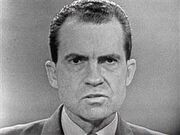
Richard Nixon: "Sock it to me? Actually, on second thought, please don't."
Harry Turtledove has made a fair amount of sport out of Richard Nixon, the historical 37th President of the United States.
In "Hindsight", a time-traveling author writes a fictionalized account of the Watergate scandal in 1953, two decades before the Watergate break-in actually took place, for the purpose of warning the past about the fallibility of powerful politicians.
In the 1960s scene of "The Weather's Fine," a poster hanging on the wall of Barefoot Sounds shows "Nixon so stoned his face is dribbling out between his fingers."
In The Two Georges, co-authored with Richard Dreyfuss, Nixon appears as "Honest" Dick, the owner of several steamer (a steam powered automobile) dealerships in New Liverpool (a heavily Britannicised Los Angeles). This is a reference to a political ad run by the Democrats in the 1960 Presidential election, which showed a picture of Nixon with the caption "Would you buy a used car from this man?" "Honest Dick" is also referred to as "Tricky Dick" by people who don't like him, which was a nickname Nixon's opponents began calling him during the lead up to the 1950 U.S. Senate election in California. "Honest Dick" makes a spectacle of himself, swearing loudly in mixed company (transcripts of the White House tapes reveal Nixon swore profusely) before being murdered.
In Colonization: Second Contact, in a scene set in 1963, a Congressman with a large nose and unshaven jowls seems to have reservations about providing the Chinese Communists with aid against the occupying Lizards. Nixon was known throughout most of his political career for his fiery anti-communism, which emphasized the significance of his decision to recognize the People's Republic of China after two decades of national shunning. The description of his large nose and unshaven appearance is similar to his appearance during the 1960 televised debate with John F. Kennedy.
In the novel version of Joe Steele, an unnamed Nixon appears as an Assistant Attorney General who makes his bones investigating and prosecuting communists during the late 1940s and early 1950s. His large nose (likened to Bob Hope's) and his black curly hair match Nixon's, as does his anticommunist credentials.
In Settling Accounts: The Grapple, a soldier named "Dick" is part of a crew that sweeps Congresswoman Flora Blackford's office for surveillance equipment in 1943. His immediate superior, Carl Bernstein has to stop Dick from speaking lest he go on for too long. Carl Bernstein was one of the investigative journalists who broke the Watergate story. Another soldier in the same unit is named Bob, and his last name is presumably Woodward. Turtledove may be fudging Nixon's identity in this one, as the OTL Bernstein and Woodward were just being born in 1944 and 1943. Still, the basic unflattering portrait of Nixon is part of the joke.
In the opening scene of The Hot War: Armistice, President Truman comments on the similarity of Nixon's nose to Bob Hope's, adding that Nixon isn't as funny.
In his essay on how to write alternate history, "Alternate History: The How-to of What Might Have Been," Turtledove buries a Nixon joke and reference to The Two Georges in a section reminding timeline predictors of the ripple effects of PODs: "This is one of those places where you can cheat. If you've got a world where the American Revolution never happened, Richard Nixon won't get born (one possible advantage to learning different words to "America the Beautiful"). But if you need a used-car salesman called Tricky Dick in the late twentieth century of that world, go ahead and stick him in. Just be aware that you are cheating, and then sin proudly. Don't drop him in for no better reason than that you haven't thought through the consequences of your change."[1]
Divorced Los Angeles Police Officers Drink Too Much
Lieutenant Shapur Razmara ("Getting Real"), Detective Ralph Sandars ("King of All"), Colonel Thomas Bushell (The Two Georges), and Lieutenant Colin Ferguson (Supervolcano), all of whom serve as police in or near some version of Los Angeles, go on the occasional drinking binges after they have divorced their respective spouses.
Edward VIII Holds the Throne
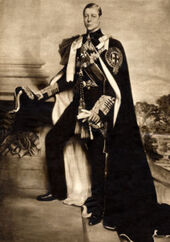
By avoiding a certain American divorceé, Edward VIII gets to keep his throne in two alternate timelines.
King Edward VIII of Britain abdicated in 1936 in OTL. He remains Monarch of the United Kingdom well past 1936 in both The Two Georges and Southern Victory.
Exploited women workers, a bullying foreman
Both Sylvia Enos in American Empire: Blood and Iron and Lucy Woo in Curious Notions are driven by economic need to a workplace where the mainly-female workforce is harshly exploited and suffers from a tyrannical and bullying foreman. Though set in different timelines and in widely disparate times and places (early 20th Century Boston in the one case, late 21st Century San Francisco in the other) the atmosphere in the workplace and the character of the bullying foreman are virtually identical in both books. Incidentally, both are placed in timelines where the United States has strong links to the Kaiser's Germany.
Fun with the Presidents
Turtledove has taken several opportunities to introduce unique moments to the history of the US presidency in several of his fictional works, moments that have no OTL analog as of yet.
The 33rd President Always Ascends
In OTL, 32nd President Franklin D. Roosevelt died in April 1945, just a few months into his unprecedented fourth term. Vice President Harry Truman ascended to the office as 33rd President.
Turtledove has written only a few stories about a 33rd President, but in all of the them, irrespective of the POD, the new president ascends like Truman did, rather than being elected in their own right after the 32nd President completes a legal term.
In Worldwar: Striking the Balance, 32nd President Franklin D. Roosevelt dies in 1944, and is succeeded by Secretary of State Cordell Hull (Vice President Henry Wallace was killed in a bombing raid a few months earlier). In Settling Accounts: Return Engagement, Vice President Charles W. La Follette succeeds 32nd President Alfred E. Smith who is killed in a bombing raid in 1942. In Joe Steele (both the novel and the short story), Vice President John Nance Garner becomes the 33rd President upon the unexpected death of 32nd President Joe Steele in 1953.
Also-rans that get the Nomination
Harold Stassen made several attempts to capture the Republican nomination in OTL, but never succeeded. In Settling Accounts: In at the Death, he is heavily implied to be the GOP's candidate in 1944, and is definitely their candidate in 1948 in Joe Steele. In Colonization: Aftershocks, Vice President Stassen actually becomes president in 1965, succeeding President Earl Warren on the latter's death in office.
Robert Taft also pursued the GOP nomination in 1940, 1948 and 1952 in OTL. He gains the 1952 nomination in Joe Steele. He's also a nominee in 1940 in American Empire: The Victorious Opposition, but as a Democrat, not a Republican.
Despotic Presidents
While a number of presidents have expanded executive powers in response to crises, none have become full-fledged dictators (although the actions of incumbent Donald Trump in 2020 are raising alarms). In Turtledove's works, events have given rise to full-fledged dictator presidents.
The most dramatic of these is arguably Joe Steele, wherein Joseph Stalin is born an American citizen and is elected President in 1932, holding the office until his death in 1953. He creates an authoritarian regime over the course of 20 years. While several presidents have flirted with a certain amount of authoritarianism, for good reasons and bad ones, none have developed a Stalinist regime.
Upon Steele's death, he is succeeded by Vice President John Nance Garner, who becomes the second president to be impeached in that world, and the first to be convicted and removed. While three presidents have been impeached in OTL (Andrew Johnson, Bill Clinton and Donald Trump), none of them were convicted. Without a legal successor available, GBI Director J. Edgar Hoover seizes power, becoming the Director of the United States, something with no analog at any time in OTL.
Another dark President appears in the short work "The Terrific Leader". Here, the eponymous Terrific Leader of the United States, a very thinly disguised Donald Trump, tyrannizes over a country that has been reduced to what is essentially an American version of North Korea. It's even presumed that his successors will be one of his sons, or perhaps his son-in-law.
Harry Truman is a more enlightened despot in The Hot War. After the Korean War spirals into World War III, Truman conducts the war more or less unilaterally, although he receives substantial criticism from Congress. After most of the United States government is destroyed by an atomic bomb in May 1952, Truman takes on a number of emergency powers. With the electoral process complicated by the need to rebuild the membership of Congress, Truman suspends the U.S. presidential election scheduled for 1952, promising to hold it in 1953. Congressional elections do take place on schedule, and Truman does not interfere, even though that will mean he's facing an extremely hostile Republican-controlled Legislative branch. No U.S. Presidential election has ever been outright suspended in OTL, although Trump has been making efforts to sabotage the legal process for the year 2020, even opining about delaying election day.
The short story "Vilcabamba" sees the presidency become a hereditary position instead of an elected one after aliens invade Earth in the 22nd Century, reducing the U.S. to a small rump. The POTUS also acts as the Prime Minister of Canada. The incumbent of the story, Harris Moffatt III, seems to function more as a benign and enlightened despot, and we have no reason to think he's repressive or tyrannical.
Madame President
Women are elected President of the United States in the 21st Century in both Homeward Bound and "Elder Skelter". While Hillary Clinton became the first woman to be a nominee for a major US party in 2016, she was defeated as a result of a series of events that any self-respecting editor of fiction would have rejected as being implausible.
Repeat Nominees: Willkie in '40 and Dewey in '44
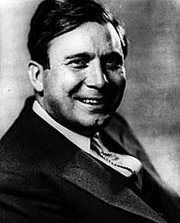
Wendell Willkie, always willing to take the bullet for the GOP in 1940 against a popular incumbent.
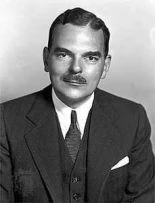
And Thomas Dewey is always willing to take a run at '44; unlike Willkie, Dewey gets to win sometimes.
In three works, Wendell Willkie is the Republican Party nominee for the office of President of the United States in 1940, just as he was in OTL: Joe Steele (both novel and story), where he is defeated by incumbent Joe Steele; The War That Came Early: The Big Switch, where he and isolationist Republican candidate Alf Landon are defeated by incumbent Franklin D. Roosevelt, and; American Empire: The Victorious Opposition, another three-way race where he and Democrat Robert Taft are defeated by incumbent Socialist Al Smith, although in this timeline, the GOP is a comparatively minor party.
Similarly, Thomas Dewey, the 1944 GOP candidate of OTL, is a candidate in 1944 in the novel Joe Steele (there is no GOP candidate in the story) and Settling Accounts: In at the Death. In a perverse twist, Dewey runs as a Democrat in the latter, and actually wins the presidency in that work. Even more "alternately", his OTL rival Harry Truman is Dewey's Vice President.
Septuagenarian Presidents
In OTL, only three sitting Presidents were in office past their 70th birthdays - Donald Trump who was already 70 at the start of the abomination that is his term, Ronald Reagan who turned 70 within three weeks of his inauguration, and Dwight Eisenhower who turned 70 toward the close of his term. Honorable mentions go to Andrew Jackson and James Buchanan, who each reached that age a few weeks after the end of their tenures. Reagan was not quite 78 at the end of his second term, making him the oldest sitting President.
In Turtledove's work, past-70-year-old Presidents are slightly more common. In the Worldwar Franchise, Cordell Hull is 72 when he succeeds to the chair in 1944, and later Earl Warren turns 70 in 1961, the first year of his elected term. In Joe Steele (both story and novel), the titular President dies in office at age 74 and is succeeded by John Nance Garner who is already 84, thus even more unprecedented in actual history. In Southern Victory, some passages seem to indicate that Hosea Blackford turned 70 while in office, but other parts of the series muddy the waters regarding this wholly fictional character's age.
All of these pale next to the surreal dystopia of the short sketch "The Terrific Leader," where the title character was elected President before seizing power as dictator-for-life, and appears to be in his 90s at story's end.
Unexpected Vacancies: The Alternate Edition
In American Empire: The Center Cannot Hold, Calvin Coolidge is elected President in 1932, but dies before his inauguration, something that has never happened in OTL.
No US President has ever been a direct casualty of war in OTL, but two have been in the works of Harry Turtledove. In Settling Accounts: Return Engagement, Al Smith is serving as President during the Second Great War, when a Confederate bombing raid hits the executive residence, killing him in 1942. In "Must and Shall," Abraham Lincoln becomes a casualty of war, when he is felled by Confederate fire at the Battle of Fort Stevens during the American Civil War.
Two of Turtledove's US Vice Presidents have been killed by enemy action as well. In Worldwar: Striking the Balance, VP Henry Wallace is killed by one of the Race's explosive-metal bombs in 1943. In The Hot War: Fallout, VP Alben Barkley perishes in a Soviet atom-bombing during World War III.
Further, Wallace's death leads to another alteration: when President Franklin D. Roosevelt dies of natural causes in 1944, he is succeeded by Secretary of State Cordell Hull. While nine OTL vice presidents have ascended to the office of president, it has never been necessary to go further than vice president in the line of succession.
In Colonization: Aftershocks, President Earl Warren is discovered in 1965 to have taken part in international crimes. In response, he commits suicide, something no sitting president has ever done.
Grant Back on the Sauce
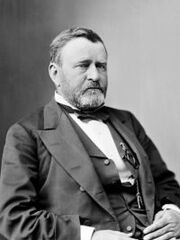
Ulysses S. Grant: Losing the American Civil War gets to him every time.
In both The Guns of the South and How Few Remain, disappointment at the Confederate victory over the United States causes Ulysses S. Grant to relapse into alcoholism.
Help From Heroes' Dead Relatives
In Werenight, Gerin the Fox receives a brief message from the ghost of his deceased older brother. Though the message is confusingly nonsensical at first, it later proves to contain invaluable information which allows Gerin to triumph in his climactic battle against Balamung.
In Krispos of Videssos, Krispos falls into a drug-induced trance after being given narcotics by Trokoundos. In the trance, Krispos meets his father, who had been dead for some years. Krispos's father helps his son reawaken memories of country along the Kubrat border which the family had traveled in Krispos's youth. This in turn gives Krispos knowledge of the country's terrain which allows him to steal a march on Harvas Black-Robe's Halogai army.
In Between the Rivers, Sharur's late grandfather accompanies Sharur on some of his adventures. The ghost sometimes offers Sharur useful advice, though he provides mere comic relief, even to the point of annoying our hero, at least as often.
Outside of fantasy stories, or in fantasies which are meant to be comedic as opposed to dramatic, or are meant to be very realistic and relatable from the perspective of readers who live in a non-magical world, characters do not deal directly with deceased relatives. Characters will often take some sort of motivation, inspiration, or solace from the memories of their lost loved ones.
Historical Figures Die of Natural Causes on Schedule, and it's a Big Deal
While Turtledove has both prolonged and cut short the lives of a number of historical figures in his alternate histories, he has also had several people who died of natural causes in OTL die on the same schedule in his fictional works, particularly those who died of congenital defects and cancer. Those deaths often become plot points of varying degrees of importance.
On-Schedule Deaths are Pretty Important
Despite being born in the USA in Joe Steele, Joseph Stalin still dies on March 5, 1953. Here Stalin, re-imagined as the titular Steele, has been President since 1933. His death leads to a whole raft of negative consequences for the country.
Stalin also dies on schedule in the short work "Ready for the Fatherland". His death helps abort an atomic war between the U.S. and the Soviet Union which would have developed into Armageddon.
Ruled Britannia is built around the pending death of King Philip II of Spain, as England, which fell to the Spanish Armada, seeks to free itself from Spanish rule. Not long after Philip dies in September 1598, the English people, inspired by a play written by William Shakespeare, successfully revolt against the Spanish.
Also in Ruled Britannia, con man and self-proclaimed alchemist Edward Kelley dies on 1 November 1597 as in OTL. The circumstances are markedly different, however. While in OTL, he reportedly died in an accident, by falling from a window in the Prague area, in the novel he is burned at the stake by the English Inquisition in London. His role in the novel is fairly minor, but the scene is quite harrowing.
In American Empire: The Center Cannot Hold, Calvin Coolidge's death on January 5, 1933 means he is the first President-elect to die before inauguration. It also means Herbert Hoover, the Vice President-elect is President, which has multiple consequences both foreign and domestic for the United States. In the next volume The Victorious Opposition, Kaiser Wilhelm II's death on 4 June 1941 is the trigger for the Second Great War in Europe.
On-Schedule Deaths are Just Part of the Scenery
Not every on-schedule death is particularly relevant to the story. In The Great War: Walk in Hell, Richard Harding Davis dies on schedule in April 1916. While General George Armstrong Custer, who'd been the subject of sharp criticism from Davis, finds cause to celebrate, Davis' death doesn't seem to cause many ripples.
In the Worldwar Franchise, both Joseph Stalin (5 March 1953) and Vyacheslav Molotov (8 November 1986) implicitly die on the same dates as in OTL, but Turtledove doesn't really examine the consequences of either death.
Former Prime Minister Neville Chamberlain dies of cancer in November 1940 in The War That Came Early: The Big Switch, just as in OTL. The circumstances of the end of his term differ greatly between the two timelines. However, as he'd been out of office for a few months, his death is simply mentioned in passing.
Wilhelm II, German Emperor is referenced throughout The War That Came Early as a cautionary example of how not to lead Germany through a world war. He is still alive for much of the series, but plays no role in the ongoing action. In later volumes he is confirmed to be dead, implicitly on the same date as in OTL.
Charlie Ross, press secretary for President Harry Truman, dies on schedule in December 1950 in The Hot War: Bombs Away. His death has no impact on the outbreak of World War III, but Truman does continue to miss Ross into January 1951.
Gilbert Gable, ad man and mayor of Port Orford, Oregon, dies in the State of Jefferson Stories in December 1941 (before Pearl Harbor) as he did in OTL. While Gable's biography in this timeline is quite altered, his death doesn't seem to cause any additional ripples.
Historical Figures Travel Back in Time
Two of Turtledove's short works send historical figures traveling through time. In "A Massachusetts Yankee in King Arthur's Court," President John Kennedy is transported from 1963 to the Arthurian age of Camelot. In "Hail! Hail!," four of the Marx Brothers are transported from 1934 to 1826 in Texas.
Hitler's Successor
It's Either Himmler...
In a few Turtledove timelines, Adolf Hitler rules Germany after 1945 and stays in office as Führer of the Greater German Reich until his natural death. In both Colonization and In the Presence of Mine Enemies, Heinrich Himmler becomes the head of state of the Greater German Reich, with Hermann Göring having disgraced himself (Colonization) or simply predeceasing Hitler (In the Presence...). Hitler also implicitly met the same peaceful fate in "Shtetl Days," but his successor in that timeline is not identified.
...Or a Disgruntled General
However, Hitler has also been overthrown by Wehrmacht generals horrified by his increasing irrationality against the backdrop of war. In "Ready for the Fatherland", General Erich von Manstein personally shoots Hitler dead in 1943 and takes over as ruler of Germany. In The War That Came Early: Last Orders, General Heinz Guderian, as the leader of the Committee for the Salvation of the German Nation, replaces Hitler (who is killed by a bomb while making a speech) as head of Germany in 1944. In both stories, Germany withdraws from WWII in a stalemate with many of its territorial gains intact.
Huey Long, Enemy of Tyrants, is Shot to Death
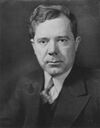
Huey Long: Forever destined to die from "lead poisoning."
In OTL, Huey Long was publicly assassinated in Louisiana when he was shot by Carl Weiss. Long is also publicly assassinated in Louisiana in Joe Steele and American Empire: The Victorious Opposition. In both works, Long was a possible hindrance to a duly elected president's efforts to seize absolute power. In the shorter version of Joe Steele, Long is "killed while trying to escape" from Fort Leavenworth, implicitly a cover for a quiet assassination.
James McReynolds, Enemy of Tyrants
In American Empire and Joe Steele, Supreme Court Justice James McReynolds is a temporary hindrance to a duly elected president's efforts to seize absolute power.
Mikhail Gorba-who?

Mikhail Sergeyevich, obscure diplomatic protocol officer.
Mikhail Gorbachev, the Russian leader who helped to dismantle the Soviet Union and end the Cold War, is mentioned posthumously in a few Turtledove stories where he has already died under varying circumstances. He personally appears very briefly in two novels - The Two Georges and Colonization: Aftershocks - in virtually identical roles as "Mikhail Sergeyevich," chief protocol officer at his country's embassies in the capitals of United States analogs.
Misandrist restaurateur finds Mr. Right
In Southern Victory and Household Gods, a world-weary female POV operates an eatery, and has declared her hatred of all men due to the testosterone-fueled wrongs done to her in the past. Ultimately she finds late-blooming true love with a man from the neighborhood, and declares him an exception to her usual pattern of thought.
Molotov and Beria battle for power; Beria loses
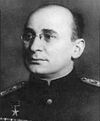
Lavrenty Beria, always a bridesmaid....
After Soviet leader Joseph Stalin's OTL death in March 1953, he was briefly succeeded by a troika of Lavrenty Beria, Nikita Khrushchev, and Vyacheslav Molotov, before Beria was ousted by Khrushchev, Molotov, and their allies. He was tried, convicted, and executed for crimes against the state in short order. Molotov did not pursue the reins of power directly, but did attempt to maintain his position as a grey eminence until he and several other hard-line party members, the "Anti-Party" group, failed to oust Khrushchev.
In two Turtledove timelines, Molotov and Beria go head-to-head for power. In Colonization: Second Contact, Molotov is in power, having immediately succeeded Stalin in March 1953. Beria bides his time and launches a coup in 1963, but it is quickly crushed by the Red Army. Molotov is restored, but his power is quite diminished. In The Hot War: Armistice, after Joseph Stalin is killed during World War III in June 1952, Beria immediately becomes leader. He attempts to carry on the war, but his lack of popularity with every level of Soviet society leads to aquick ouster, with Molotov succeeding Beria a month after Stalin's death.
The Nazis Can't Win For Losing
While Turtledove has dealt with several timelines where the Nazis won or at least did better than in OTL, he has also written several stories where the Nazis remains in power after 1945 but still manage to undo themselves, a proposition arguably supported by history.
- The most dramatic example is Colonization, where Nazi Germany, having survived an extra 20 years, launches a war against the Race, confident that the Race will fall. It doesn't, and the Reich is crushed in short order. Germany has clawed its way back to superpower status by the 21st-century events of Homeward Bound. The text heavily suggests, though it does not definitively state, that the National Socialist German Workers' Party continues to control, or has regained control of, the German government. Whether this party has softened remains unclear.
- Despite their best efforts, the Nazis are unable to completely wipe out the Jews in the short story, "In the Presence of Mine Enemies", as some hide in plain sight well into the 21st century. In the novel that expands the story, the Nazis find their rule challenged by reformers who harken back to the democratic ideals found in the slightly softer first edition of Mein Kampf.
- In "Shtetl Days", the 21st-century German Reich decides to build historical Jewish villages populated by re-enactors. The Nazi demand for authenticity soon gives birth to new Jews, as the Aryan actors begin to identify more with their Jewish characters than with the cruel world the Nazis have built.
No One Bleeds Pinstripes
Turtledove's alternate history tales very often result in great New York Yankees of OTL playing their baseball careers elsewhere.
- In "The House That George Built," when George Ruth (sometimes called Babe) finally managed to break into the major leagues he played for the Philadelphia Phillies, Boston Red Sox, and St. Louis Browns, but never the Yanks. The void in baseball history left by Ruth's absence is filled by Buzz Arlett, who plies his trade not for the Yankees but for the Brooklyn Dodgers. Even after Arlett's retirement, the glamour that his presence gave the Dodgers has made them into perennial contenders, as the OTL Ruth did for the Yankees.
- In American Empire: The Center Cannot Hold, Lou Gehrig plays football instead of baseball, like virtually all historical baseball players named in the series. Gehrig plays not for a New York team (which could be thought of as a Yankees analog) but for the Philadelphia Barrels.
- In Colonization: Aftershocks, Mickey Mantle plays for the Kansas City Blues.
Orson! Orson! Calling Orson
A disproportionate number of Turtledove's Mormon characters are named "Orson": Orson Sharp in the Days of Infamy Series, Heber Orson Woodruff in The House of Daniel, and three Orsons in Southern Victory (one of whom is Orson Pratt, a historical figure). This probably has historical justification; apparently this name was indeed very popular in Mormon culture at some point. There may also be an intended allusion to Orson Scott Card, a Mormon author of science fiction, fantasy, and alternate history. Card and Turtledove have occasionally edited each other's works. In particular, Orson Sharp may be a pun on "card sharp".
Oswald Mosley Calls the Tune
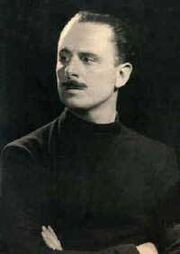
Oswald Mosley: "Bitch please, I OWN this country (mostly)."
Although he doesn't quite rule Britain in Southern Victory, Oswald Mosley (founder of the OTL British Union of Fascists) is extremely powerful and influential as Minister of War in the British government from about 1932 to 1944. He apparently attained the office of prime minister in the backstory of In the Presence of Mine Enemies. He also has tremendous influence in parts of Colonization and The War That Came Early. There is also a curious flourish that Mosley's supporters wear silver shirts in both SV and TWTCE, whereas they wore black shirts in OTL.
Prime Minister Horace Wilson
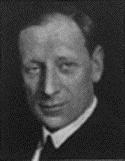
While an important figure in British history as Neville Chamberlain's most trusted adviser, Sir Horace Wilson was never an MP, much less a PM. However, in both Settling Accounts: In at the Death and The War That Came Early: The Big Switch, Wilson becomes Prime Minister of the United Kingdom.
Reactions to Losing Parents
Losing Parents Is Hard
In Southern Victory, the murder of Sylvia Enos led George Enos Jr. to wrestle with feelings of anger and bitterness from which he had not fully recovered by the end of the series.
Also in Southern Victory, the death of Marie Galtier pushed the normally lighthearted and humorous Georges Galtier to experience inconsolable grief.
In the same series Nicole O'Doull's grief at the death of Lucien Galtier leaves her feeling somewhat tender, to the point that she is hurt by her husband's sardonic comment about the sordid circumstances of his death--though Leonard also feels a profound sense of loss at his father-in-law's passing.
Still in Southern Victory, in the death of Arthur McGregor inspires his daughter to devote her entire life to avenging him. Later, Mary's death traumatizes her young son.
In the Elabon Series, Gerin the Fox deeply mourns the death of his father, naming his oldest son in his father's honor and desiring revenge against the Trokmoi for decades.
The Videssian hero Krispos is deeply affected by the death of his father. This is expressed in many ways throughout the trilogy of books which tell his story.
In Opening Atlantis, Ethel Radcliffe is so affected by the death of her father that she spends two decades plotting her revenge against William Radcliff, who was responsible for the pirate's demise. Ethel kills him. She is so driven to avenge her father that she cares nothing for the facts that she will die herself; that she will leave behind her husband and children; nor that William Radcliff had shown her mercy at Avalon and that she had benefited from his generosity and providence since then.
Losing Parents Is Hard, But Other Things Are Harder
In Southern Victory's The Victorious Opposition, Lucien Galtier reflects on the death of his wife by thinking that he had thought losing his parents had been hard. He quickly amends this to say that it had been hard, but that losing his wife was much harder.
Later, in Return Engagement, Leonard O'Doull considers Marie's death to have been one of the greatest sources of pain in his married life with Marie's daughter Nicole. Two other sources of pain were the deaths of Lucien himself and of Leonard's mother, the latter of which occurred offstage and was never commented on at the time. O'Doull quickly concludes that these parental deaths had not been painful enough to pose any serious disruption to the happiness of his life in Riviere-du-Loup.
In Drive to the East, Cincinnatus Driver mourns his mother, but does not feel as heartbroken at her loss as he might have, since she had already been half dead from Alzheimer's, and he is more concerned with himself and his father surviving genocide.
In the same series, Cassius Madison grieves for his father and mother as well as his sister, but his grief comes within the context of mourning for the millions of black people who died under the genocidal Freedom Party, which lessens the feeling of individual loss.
In The Man With the Iron Heart, Diana McGraw reflects that, had her mother died instead of her son, she would have experienced emotional pain, but not as much as she did at losing Pat.
In Opening Atlantis: New Hastings, the death of Edward Radcliffe affects his sons Henry and Richard not so much as the death of a parent, but as an illustration of the threat which the Earl of Warwick poses to New Hastings.
This dynamic may be reversed in the case of Krispos. Even as late as Krispos the Emperor, he remembers his father far more often than he does his wife, his sisters, or his foster brother, who all died much later.
Losing Parents Is Not Hard
In Liberating Atlantis, Frederick Radcliff thought of his father from time to time, but never seemed to feel his loss, which occurred when Frederick was only three.
In Settling Accounts, Jorge Rodriguez does not have much of a reaction to the news of Hipolito's death.
In Krispos the Emperor, Krispos' sons young Phostis, Evripos, and Katakolon never seem to give much thought to their late mother Dara.
In Southern Victory, George Enos Jr. quickly comes to terms with the death of his father, although his mother's death is a different story.
Especially if the Reader Never Met Them
In Southern Victory, Anne and Tom Colleton often think back on their deceased brother Jacob, at least in the years immediately after his death, and in Walk in Hell and Breakthroughs, his memory drives them to seek revenge against the leaders of the Congaree Socialist Republic. After Anne's death in Return Engagement, Tom sometimes remembers Anne as well, but neither one ever spares much of a thought on their parents, who had died offstage before the characters were introduced, and while Anne and Tom were quite young.
In the same series, Jake Featherston lost both of his parents before his character was introduced in American Front, meaning they died when he was in his early 20 at the latest, an age at which most people still have a great deal of parental involvement in their lives, especially people who are unmarried (as Jake was). Nevertheless, in ten novels as a viewpoint character, with scores of scenes he narrates, Featherston mentions his parents only twice: once to say that his father had been an overseer who resented manumission of slavery, and once to say that he had never allowed his mother to fuss over him while she lived. Neither reference gives any sign of a mournful tenderness; the former carries no emotional charge whatsoever, while the latter seems to suggest some irritation and resentment.
In the Darkness series, neither Skarnu nor Krasta ever gives much of a thought to their deceased parents (who died before the series began), despite both siblings being major POV characters throughout the six books. Vanai, another Darkness POV whose parents were killed before the action commences, likewise thinks but very seldom of them.
Robert E. Li?

Robert E. Lee, the first Chinese-American success story?
In Curious Notions and The House of Daniel, POV characters encounter Chinese-American characters named Lee, and remark on the similarity of the names to Robert E. Lee.
Shakespeare's recusancy

Dominus vobiscum, Will.
Biographers of William Shakespeare sometimes suggest that both he and his father may have been Catholics, in defiance of Queen Elizabeth's imposition of the Church of England as England's national religion. There is a fair amount of evidence that the elder Shakespeare may have been a recusant, but it is not definitive: He was fined for failing to attend Church of England services, and in the 18th century a signature of dubious authenticity was found on a written pledge made to St. Edmund Campion, swearing to remain a Catholic in his heart despite the difficulty of receiving Sacraments regularly in the face of Protestant persecution.
For Will Shakespeare himself, there is no hard evidence of recusancy, merely speculation and assumed double meaning in some of his writings.
In both his Shakespeare-POV stories, Ruled Britannia and "We Haven't Got There Yet," Turtledove uses the idea that John Shakespeare was Catholic throughout most of a lifetime of persecution. He also shows Will, while not as willing to profess the faith himself, at least sympathetic to Rome. In the novel, Will mulls over the fact that he finds Catholic ritual appealing, and suggests that, if he were allowed true religious freedom, he might adopt Catholicism. In the short, after reflecting that his father had practiced Catholicism, the narration adds that William "retained some leanings that way himself."
Stan the Man
Turtledove has on two separate occasions named female POVs' young grandsons Stan: Stan Enos, grandson of Sylvia Enos, in Southern Victory; and Stan Neft, grandson of Diana McGraw, in The Man With the Iron Heart.
Storm=Strom
In Settling Accounts: Return Engagement, Turtledove implies the presence of the historical figure Strom Thurmond by having Anne Colleton make an offhand reference to "Storm or something like that" when a Freedom Party Congressman who strongly resembles the historical Thurmond is speaking to the crowd. In Liberating Atlantis, Thurmond is invoked by Atlantean Senate titan Storm Whitson, a Thurmond-like character who lived in the 18th and 19th centuries.
Terrible Cooks, But Not Too Terrible
In any Turtledove story, be it fantasy, alternate history, science fiction, or straight fiction, short story, standalone novel, or series, any time a character finds himself in a situation in which a meal must be hurriedly prepared under field conditions, he will almost invariably find himself being served meat that is "burnt on the outside and raw on the inside," and Turtledove will mention that he eats it anyway.
Tough But Lovable Sergeants
In all of the Turtledove works describing the life of combat soldiers - Southern Victory, Worldwar, Darkness, The War That Came Early, and numerous other examples - there are recurring appearances of tough sergeants who are often hated by the soldiers under their direct authority but are also appreciated by them. (The Darkness POV character Istvan starts out as a raw recruit, mercilessly disciplined and punished by Sergeant Jokai in Into the Darkness; after having undergone terrible combat and being promoted to sergeant, Istvan is startled to find himself copying the mannerisms of Jokai - who was killed in the first volume - and then reflects in Darkness Descending that "Of whom can one learn how to be a sergeant, if not of a sergeant?") As especially evident in multiple-POV series, sergeants act in much the same way in all armies, whatever the regime, ideology and cause they serve - Democracy, Absolute Monarchy, Fascism/Nazism or Communism. Also the magical weapons used in the Darkness Series make no difference to the character of the sergeants, and also the non-human soldiers of the Race have their own close approximations.
A VIP's Death Sparks World War II
Much as the assassination of Archduke Franz Ferdinand of Austria triggered World War I in OTL, Turtledove has used the death of a prominent person to help trigger several World War II analogues. In American Empire: The Victorious Opposition, the death of Kaiser Wilhelm II helps trigger the Second Great War. In Into the Darkness, the death of Alardo, Duke of Bari is the catalyst for the Derlavaian War, a war closely based on our World War II. In The War That Came Early: Hitler's War, the assassination of Konrad Henlein triggers a different World War II in 1938.
Places
Almost heaven, western part of Virginia
In The Two Georges and The Disunited States of America, Virginia includes West Virginia within its borders, as there was never an American Civil War to schism the commonwealth. This is likely also the case in A Different Flesh.
America Imperialized
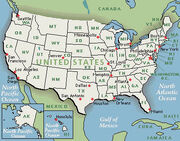
United States: There's always tomorrow for dreams of independence to come true.
In Curious Notions, In the Presence of Mine Enemies, The Gladiator, the Days of Infamy Series, "Getting Real," and "Vilcabamba," the United States is, in whole or in part, the victim of imperialist exploitation by outside powers.
. . . But Still A Threat
In Curious Notions, In the Presence of Mine Enemies, The Gladiator, and Days of Infamy, said external powers are concerned that the U.S. could still pose a viable threat to them, not just in American territory but on the world stage, if it were to launch a determined rebellion or resistance. Indeed, in Days of Infamy, the story ends with the U.S. retaking Hawaii, and the timeline more or less converging with OTL.
In "Getting Real" and especially "Vilcabamba," however, the imperialists are inclined to laugh off American resistance.
AZ+NM=1

Map of the State of New Mexico or province of Phoenix, depending on the timeline.
The areas known in OTL as Arizona and New Mexico are a single political entity within a large nation in Southern Victory and The Two Georges. In the former, it's simply a larger New Mexico in the truncated United States, in the latter it's the province of Phoenix in the North American Union.
Bluegrass Gray: Kentucky, CSA
Throughout the American Civil War in OTL, Kentucky, a border state, never fully joined the Confederate States, although there was a pro-Confederate government that existed, and several Kentuckians held high Confederate ranks.
In Turtledove's work, Kentucky has joined the Confederacy in The Guns of the South and Southern Victory. In the former, the state chooses to do this by plebiscite after the end of the Second American Revolution in 1864, and this situation remains intact at the novel's end four years later. In the latter, the state is conquered by Confederate forces in 1862 during the War of Secession. Eventually it is reconquered by the United States in 1916 during the Great War. Then in 1941, Kentucky votes in the Richmond Agreement Plebiscite to rejoin the Confederacy.
Boston, Oregon
The popular (but probably apocryphal) story of the naming of Portland, Oregon holds that different groups of settlers, from Boston, Massachusetts and Portland, Maine, flipped a coin to decide the matter. This coin toss is referenced in The Two Georges, where it went the other way. The same thing seems to have happened in The Case of the Toxic Spell Dump, although there is some inconsistency on this point. Incidentally, both novels are set in worlds where analogs of the United States are ruled by some kind of constitutional monarchy.
Brits burn postbellum San Francisco
In both The Guns of the South and How Few Remain, the United States' defeat in the Civil War is followed, after a decent interval, by a war between the United States and the United Kingdom. In both timelines, the Royal Marines land in San Francisco, burn much of the city, raid the mint there and hop back onto their ships to make a getaway.
Canada Vital to US Survival After the Country is Cut in Two
In both Worldwar and Settling Accounts, the United States is cut in half by foes, and desperately requires the infastructure of Canada as a method of getting men and material from one side of the U.S. to the other.
Confederacy Subject to Harsh U.S. Occupation by 1940s
In both "Must and Shall" and Settling Accounts: In at the Death, the victorious United States defeats and occupies the entire Confederate States, placing it under martial law and initiating retributions against anti-U.S. rebellion. In addition and in comparison, the occupation of the Confederacy in Settling Accounts begins in 1944, rather than beginning in the 1860s and continuing into at least 1942 as had occurred in "Must and Shall."
The Disunited Kingdoms of Great Britain and Ireland
England and Scotland remain separate political entities in the 21st century, without a United Kingdom, in In High Places and Through Darkest Europe. Ireland is a patchwork of separate feudal states in the same. Both works have a medieval POV which results in Christian Europe remaining backward compared to the Muslim world.
The Disunited States of Germany
In The Two Georges, In High Places, The Disunited States of America, Through Darkest Europe and apparently in A Different Flesh, the German states never unified, and remain small kingdoms well into the 20th and/or 21st centuries. In Through Darkest Europe, a powerless Emperor puts up a toothless pretext of ruling them all, but is largely ignored.
The Disunited States of India
21st-century India is a disunited region of multiple nation-states in Gunpowder Empire and Through Darkest Europe.
The English Channel is "the Sleeve"
In Agent of Byzantium, "Down in the Bottomlands" and "Running of the Bulls", the English Channel is called "the Sleeve", as the French call it in OTL.
German India
British India gets transferred straight from the British Empire to the German sphere of influence in Curious Notions, In the Presence of Mine Enemies, and "The Last Article". The latter two may be set in the same universe. For a change, in Colonization British India is taken over by the Race.
Germany goes to Mars

In both Colonization and In the Presence of Mine Enemies, Nazi Germany makes a manned trip to the planet Mars, although in Colonization, the United States goes there shortly after. In addition, in The Disunited States of America, Prussia is one of two countries to send manned flights to Mars (the other being California). For a switch, in Curious Notions, the Germans send an unmanned probe to Mars, and decide not to bother with any manned missions.
Hawaiian Sandwiches
In OTL, Royal Navy Captain James Cook explored Hawaii in 1778, and dubbed the archipelago the Sandwich Islands, after his benefactor the Earl of Sandwich. This name for Hawaii was used by Europeans and North Americans until around 1840, when the native name became more popular. For unexplained reasons, the Sandwich name has taken precedence again in The Case of the Toxic Spell Dump, The House of Daniel, and Southern Victory.
Italy: Unreliable Ally
In Turtledove's works, especially those set during World War II, Italy resembles an albatross around the neck of its allies, usually Germany, and rarely aids its Axis.
In Southern Victory, Italy refuses to meet its obligations to the Central Powers in 1914, just as its OTL counter-part did. In this timeline, however, Italy stays out of the Great War entirely, rather than changing sides to the Entente as it did in OTL 1915. It also avoids participating in the Second Great War.
In The War That Came Early, Benito Mussolini expresses panic at Adolf Hitler's plan to launch war in 1938. Even after the war breaks out, Italy officially declares war on the Allies, but limits its involvement to a half-hearted conflict with Britain in North Africa, and refrains from participating in Europe altogether. Italian support for the Nationalists in the proxy war in Spain is also halfhearted.
In Worldwar, Italy surrenders to the Race relatively quickly, and only the presence of German troops in Italy proper keep it from falling altogether. After the Peace of Cairo, Italy is nominally independent, but remains a vassal of the Reich.
In The Hot War, northern Italy falls quickly to the Soviets during World War III; it's suggested at one or two points that the conquest is helped along by collaborators from the Italian Communist Party. The Soviets don't push further within the country because they don't regard southern Italy as a very desirable possession. Instead they prefer to use their northern gains as a jumping-off-place from which to invade France, a far more valuable prize.
In the Darkness series, Yanina, an analog to several of the lesser Axis powers, mostly Italy, is noted for being pretty worthless and ineffective during the Derlavaian War, with a few exceptions.
Japan Attacks Soviet Union/Russia
In OTL World War II, Japan and the USSR fought a series of border skirmishes in the late 1930s, then reached a ceasefire and remained at peace with each other all through World War II until the Soviets invaded Japanese holdings in mainland northeastern Asia in August 1945.
- In The War That Came Early, in which the main war begins while the Soviet-Japanese war is still festering, the Japanese take advantage of Soviet distraction in Europe to launch an ultimately successful offensive to gain Vladivostok.
- In Settling Accounts, Japan makes territorial demands on the Russian Empire after the Second Great War. Much like the previous item, Japan is seeking to control parts of Siberia.
- In the Darkness series, Gyongyos, which is a Japanese analog, resumes its earlier war in the sparsely inhabited forests of the Gyongyos-Unkerlant border region, again forcing Unkerlant (a Soviet analog) to keep an eye on its remote frontier while fighting a major war at the other end of its massive territory.
Japan By Any Other Name
The Japanese are referred to as "the Nipponese" in both Worldwar (by the Race) and "Birdwitching" (by everyone, apparently).
Japan Controls Korea
In The Two Georges, In the Presence of Mine Enemies, and Southern Victory, Korea fails to be liberated or liberate itself from the domination of Japan in 1945. (For a switch, the Race controls Korea in Colonization.)
Japan Controls the Philippines
Japan retains hegemony over the Philippines beyond 1945 in In the Presence of Mine Enemies, Southern Victory, and Colonization. For a change, in The Two Georges it is Spain who controls the Philippines throughout the 20th century.
Japan is Divided by the United States and the Soviet Union
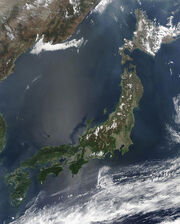
Japan: A Cake to be Carved by the United States and the Soviet Union.
In both Joe Steele and "Ready for the Fatherland", World War II ends with Japan divided up between the United States and the Soviet Union. In both stories, the Soviets control Hokkaido. In both stories, this arrangement is followed in less than a decade by a war where each side attacks the other's territory with an atomic bomb before they reach a peace treaty of status quo ante bellum. The War That Came Early: Last Orders ends with ominous hints at a similar future, as the US and USSR are preparing to jointly invade Japan's holdings, and various countries are in the process of looking into developing the first atomic bomb.
Japan vs. U.S.: Grudgematch
In several Turtledove timelines, Japan and the United States became enemies much as they did in OTL, without regard for Point of Divergence.
- In Southern Victory, Japan develops into the USA's second-most hated enemy (though it might be tied with Britain), after the Confederate States, over the course of the first half of the 20th Century. The US and Japan are at war during the Great War, the Pacific War, and the Second Great War. Neither party gains a decisive victory over the other in any of the three wars. With the complete defeat of the CSA and the weakening of Britain in 1944-5, Japan becomes the USA's only remaining rival.
- In The War That Came Early, despite US isolationism and Japan's actions against the Soviet Union, a Japanese-American war breaks out in January 1941.
- In Joe Steele, for many of the same reasons as OTL, Japan still attacks the United States in WWII. This war ends with a bloody invasion of Japan by U.S. forces, and the partitioning of Japan into two countries, analogous to OTL Korea.
- In the Days of Infamy Series, the antagonistic relationship occurs basically on schedule. However, Japan goes to one more extreme and occupies the whole of Hawaii, rather than simply raiding Pearl Harbor.
And Japan Takes Midway
Japan is able to occupy Midway during a World War II analog in multiple Turtledove works, including, but not limited to: the Days of Infamy Series, Settling Accounts, The War That Came Early, Worldwar, and "News From the Front".
The Kaiserreich Occupies Belgium
Kaiser Wilhelm II's Germany occupies Belgium after winning a World War I analog in both Southern Victory and "Uncle Alf", and presumably (but unstated) in Curious Notions as well.
German Congo
The Belgian Congo is ceded to Germany in both Southern Victory and In the Presence of Mine Enemies, after a German victory in WWI in the first case and WWII in the second. In both cases, the Germans were nastier rulers than the Belgians, but Turtledove spares us the details.
Los Anglo-es
In OTL, the United States conquered California (among other states) away from Mexico in 1847 during the Mexican-American War, but has left the names of its major Spanish-built cities intact to this day, including Los Angeles and San Francisco. The timelines of both The Case of the Toxic Spell Dump and The Two Georges saw analogous wars which were followed by the victors completely Anglicizing the map. In Spell Dump, LA and SF go by the literal translations Angels City and Saint Francis, while in Georges they abandoned the old names even further and chose New Liverpool and Drakestown.
A Major War Starts in the Wake of a Territorial Dispute Involving Germany
In American Empire: The Victorious Opposition, the Second Great War starts after Germany refuses to return Alsace-Lorraine to France. In Colonization: Down to Earth, the Race-German War of 1965 begins when Germany attempts to reclaim Poland, which it claimed was rightfully German.
Mighty Ukraine
In OTL, Ukraine has never been a powerful nation; indeed, it has seldom been an independent nation, having spent much of its history bleeding at the hands of brutal conquerors. By contrast, in at least two Turtledove timelines - The Case of the Toxic Spell Dump and The Disunited States of America - we are told (although not shown in any detail) that Ukraine is one of the bigger players in Europe, enough to make other nations watch out.
Mississippi Burning - Upside Down!
Alternate versions of Mississippi, where black people brutally oppress white people (rather than the other way around, as was tragically the case in OTL) are depicted and/or described in "He Woke in Darkness" and The Disunited States of America, the latter of which has Black Southerners controlling Mississippi (which historically had a disproportionately majority black population). In "Must and Shall," black rule over a malcontent white population seems to be the way throughout the South, but Mississippi is not referenced specifically.
Missouri Forever
In OTL, Missouri never became a part of the Confederate States, although numerous Missourians fought for that side during the American Civil War. Early during the war, half of Missouri was invaded and occupied by Confederates before they were driven out by Union forces.
In The Guns of the South and Southern Victory, Missouri stays in the Union. In the former, Missouri votes in a plebiscite to stay after the Second American Revolution. In the latter, the U.S. gets to keep Missouri after the War of Secession, in a compromise made with the C.S., despite proposals to split the state in two.
Monarchy Forever
In some Turtledove stories, monarchies and empires that collapsed in OTL, are still in power well after their OTL expiration dates.
Austria-Hungary Forever
For one reason or another, the Austro-Hungarian Empire survives into the 20th and/or 21st centuries in Southern Victory, Curious Notions, The Disunited States of America, and The Two Georges (though Hungary doesn't get name recognition in the last). It presumably survives in "Uncle Alf" but is not addressed.
The Brazilian Empire Forever
Brazil is an empire in Curious Notions, "Manuscript Tradition", and Southern Victory. In the first two, the Empire was restored at some point; in Southern Victory, it simply never fell.
The Kingdom of Iran Forever
In Crosstime Traffic's home timeline, and in "Manuscript Tradition" the monarchy in Iran (toppled in 1979) is restored sometime in the 21st century.
The Ottoman Empire Forever
For one reason or another, the Ottoman Empire survives well past 1922 in Southern Victory, Curious Notions, and The Two Georges. However, in the last two it is implicitly a puppet of even larger empires. It presumably also survives in "Uncle Alf" but is not addressed.
The Russian Empire Forever
For one reason or another, the Russian Empire continues to exist after 1917 in The Two Georges, Southern Victory, "Uncle Alf" and The Disunited States of America.
More Monarchism
The above several entries are specific cases of a more general theme, appearing in numerous Turtledove works – timelines where historical developments facilitated the survival and/or restoration of monarchies where they have become extinct in OTL.
These include, among others:
- In The Two Georges, the American and French Revolutions were both nipped in the bud, and with them modern Republicanism as a whole. Monarchy remains the common form of government throughout the world as of 1995, with republican forms of government being confined to the Swiss cantons and some Italian and German city states of marginal importance.
- In OTL, the First World War culminated with a great fall of old monarchies and creation of many new republics (as well as one newly-created monarchy, Yugoslavia). A different outcome of WWI could have a different fate for monarchies:
- In Curious Notions, the victorious Imperial Germany not only preserves its own monarchy and props up those in Austria-Hungary and the Ottoman Empire, but also actively restores fallen monarchies, e.g. in Portugal, Brazil, and China – all of which remain in place at the close of the 21st century.
- In Southern Victory, the Central Powers victory in the Great War gives an extra lease of life to existing empires (German, Austro-Hungarian, Ottoman, and Russian), and also leads to restoration of old kingdoms - e.g. Poland, where a monarchy abolished in the 18th century is revived as a German satellite, and France, where a monarchy abolished in the 19th century is revived by rabid anti-German nationalists. Already earlier in Southern Victory, victory of the Confederacy makes possible the stabilization of Habsburg monarchy as the decades-long government of Mexico, where it was a fleeting unsuccessful interlude in OTL. Brazil also retains a monarchy for much longer than in OTL, but the circumstances of how this happened are not explored.
- However, Southern Victory also includes the fall of the Spanish monarchy (a few years after the OTL fall, which was followed by a restoration after a 44-year interregnum); the end of the Canadian monarchy (which still persists in OTL) and in particular the attainment of the goals of Quebecois republicanism; and a victory for Irish republicanism that is both 30 or so years earlier and more total (with the northeast counties included) than it was in OTL.
- In "Uncle Alf," Germany remains under the rule of Kaiser Wilhelm II in 1929, 15 years after Wilhelm led it to victory in the Great War. Wilhelm was also directly responsible for the Russian Empire's survival under the continued rule of Tsar Nicholas II.
- In the Presence of Mine Enemies sees the Japanese-backed puppet Empire of Manchukuo surviving into the 21st Century, whereas in OTL it was dismantled after barely a decade. Manchukuo is also referenced in "The Last Article", which may or may not be set in the same timeline as In the Presence.
- In the Days of Infamy Series the Polynesian monarchy of Hawaii is restored as a Japanese puppet after the islands' conquest by Imperial Japan. However, this turns out to be a temporary situation.
- Some of the numerous mini-states into which the United States broke up after the 1967 nuclear war in The Valley-Westside War developed monarchist governments, with their specific kind of ceremonial and ritual (for example, a King a wears a 20th century-style business suit as his royal regalia).
- In The Case of the Toxic Spell Dump, the magical version of Mexico is an Empire, while the magical United States appears to be a constitutional monarchy in the nature of the United Kingdom.
- Medieval-style monarchism dominates western Europe at the close of the 21st century in In High Places.
- In Gunpowder Empire, the whole of Europe and Asia are dominated by a string of stable and long-lived empires, including the 2000-year old Roman Empire, its even older rival Persia, the younger but still many centuries old Lietuva (a rough analog of OTL's Polish-Lithuanian Commonwealth), and further east China and two empires sharing India. Of the latter three only scant information is given and no explicit reference is made to their form of government, but they can be assumed to be monarchies, too.
- The breakdown of American society in "Half the Battle" results in a monarchist resurgence as new nation-states emerge in southern California, eventually forming a new empire.
- In "Les Mortes d'Arthur," Siberia breaks away from the Soviet Union sometime after the story's 1985 publication date, and establishes a monarchy which is incumbent in the 22nd century.
- In Through Darkest Europe, most nations in Europe, as well as many in Asia and Africa, are monarchies in the 21st century. One of these is the Seljuk Empire, which only lasted until the 12th century in OTL but is sitting pretty in the novel's version of 2018.
- "Trantor Falls" is set in Isaac Asimov's vision of a far future where humanity has attained a "Class III" civilization. Monarchy is the form of government which presides over this civilization, though "Trantor Falls" shows its importance waning as the Galactic Empire dissolves into numerous competing factions.
The Nation of Quebec
Quebec has become an independent country in Southern Victory and "Elder Skelter". It is also independent in The Disunited States of America, but that features a North America that is totally Balkanized, so Quebec's status as a country isn't as remarkable.
Nazi Germany Survives World War II
Nazi Germany manages to continue after 1945 in "The Last Article", "The Phantom Tolbukhin", In the Presence of Mine Enemies, "Shtetl Days", "Ready for the Fatherland", and the Worldwar Franchise. In most of these, Germany actually wins World War II, but in Worldwar and "Ready" WWII ends in a stalemate where all the major players survive. And while the Nazis aren't in power at the end of The Man With the Iron Heart, it is strongly implied that they will be making a comeback within the foreseeable future.
No Israel
The modern state of Israel, recognized in 1948, rarely exists in the works of Harry Turtledove for one reason or another. It does exist in "The R-Strain," but is subject to never-ending attacks upon its sovereignty, with "no end in sight" well into the 21st century. Israel is the primary setting of Alpha and Omega, where it is subject to brutal terror attacks, although the novel ends on an ambiguously hopeful note for Israel.
Israel Defeated
In "Occupation Duty", the Kingdom of Israel was defeated and conquered by the Philistines when Goliath slew David sometime around 1000 BC, and any concept of an Israelite/Jewish identity ceased to exist. In "Next Year in Jerusalem" and "Les Mortes d'Arthur", Israel is defeated by Arab states in the 21st century. (The two stories may or may not take place in the same timeline). In "Shock and Awe," a rebellion by a Jewish sect, led by a thinly disguised Jesus, is defeated by the Romans in AD 30.
Israel Stillborn
In Colonization and In the Presence of Mine Enemies, outside forces prevent the Zionist dream of a Jewish homeland from coming to fruition. In Colonization, the Race encourages Jewish settlement of Palestine because Jews are among the Tosevite peoples most amenable to Race governance. The Race shows no inclination to extend them statehood, however. In Presence, we meet the far darker specter of the Nazis controlling the traditional Jewish homeland.
In Through Darkest Europe, the continuation of the Seljuk Empire, and the lack of an anti-Jewish Holocaust, have eliminated the drive for a Jewish state. There is a Jewish Nationhood Society which seeks to create a Jewish homeland, but few people expect this goal to be met.
See also: Palestine: Sleepy Backwater.
Oklahoma, CSA
Indian Territory (Oklahoma) goes to the Confederate States after that nation wins American Civil War analogs in The Guns of the South and Southern Victory.
Oregon forever
The American state of Oregon has never been an independent country, nor even sought this status in OTL. In both The Disunited States of America and Through Darkest Europe, Oregon seems to be a recognized nation-state in the 21st century.
Palestine: Sleepy Backwater
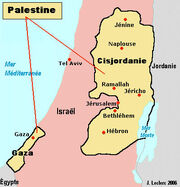
Harry Turtledove seems to think Palestine should'a stayed in bed.
In Southern Victory and The Two Georges, Palestine is specifically referred to as a sleepy backwater province of the Ottoman Empire. In Gunpowder Empire, another alternate Palestine-as-sleepy-Ottoman-province is referenced, but that actual timeline is not shown. For a change, in Agent of Byzantium, Palestine is a sleepy Byzantine province.
Pearl Harbor Attack a Failure
In both Settling Accounts: Return Engagement and The War That Came Early: The Big Switch, the Imperial Japanese Navy launches an attack against United States Navy Forces stationed in Pearl Harbor, and in both cases it fails due to the US Navy discovering their attack force.
Protracted Russian Civil War Post-World War I
Russia falls into a lengthy civil war after being on the losing side in a World War I analog in both American Empire and Curious Notions. In the former, the resulting war begins for much the same reasons as in OTL, while in the latter the circumstances of the civil war aren't specified. By contrast, in "Uncle Alf", Russia's defeat in 1914 somehow caused the Russian Revolution to happen a year ahead of OTL, but it was nipped in the bud by German intervention.
The President Lives in the Gray House
Southern Victory and Colonization have Executive Mansions known as the Gray House. In the former, the Confederate President resides in the Gray House in Richmond. In the latter, the Gray House is the home of the American President in the new capital of Little Rock (the original White House having been nuked along with Washington, DC during the Race Invasion of Tosev 3).
Revanchist Britain and France
Britain and France become revanchist after losing a World War I analog to Germany in Southern Victory and Curious Notions, and both are soundly trounced by the Kaiserreich in a rematch a few decades later. In Southern Victory, seven of the series' eleven volumes take place during those conflicts, while in Curious Notions, barely a page is devoted to each war.
Rhode Island won't be missed
Both Southern Victory and Supervolcano have moments where characters say that if an explosion blew Rhode Island off the map, it would be the best thing to ever happen to the place. Oddly enough, the initials of both these titles are SV.
Russian Alaska
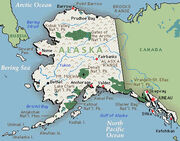
Welcome to Аляска!
Alaska (purchased by the U.S. in 1867 in OTL) is a Tsarist Russian territory into the 20th and/or 21st centuries in The Two Georges, The Disunited States of America, Southern Victory, and "Liberating Alaska". Although in the latter story, the U.S. does take control of Alaska around 1920. At the end of The Guns of the South, Russia still owns Alaska in 1868, but is likely to sell it to the U.S. within the year.
Southern Empires Join Northern Barbarians to Resist Even More Northern, Even More Barbaric, Barbarians
In Elabon: King of the North, Gerin the Fox, an Elabonian feudal-lord-turned-sovereign-monarch, joins with the Elabonians' longtime enemies, the Trokmoi who live to the north of his land, in an uneasy alliance to fight the Gradi, a much crueler, much more aggressive barbarian tribe from even farther north. In The Opening of the World Series, the Raumsdalian Empire, the Bizogots, and the Rulers copy the same dynamic both geographically and socio-politically. In Krispos of Videssos, Kubratoi survivors help the Videssians fight Harvas Black-Robe's Halogai, albeit not terribly effectively.
Southron Empires vs. Northern Secessionists
In the Elabon Series and The War Between the Provinces, "southron"-based empires face the loss of their northern provinces who have declared secession. In Elabon, the Elabonian Empire neglects its northlands, resulting in the self-sufficiency of the north and the rise of several petty kinglets in the region, but there is no formal declaration of independence until the final volume Fox and Empire, when the Empire's attempt to retake the wayward holdings results in an outright Elabonian Civil War. The reader is forced to take the secessionist viewpoint, due to the lack of any southron loyalist POV. In War Between, the Detinan Civil War is a close analog of the American Civil War (with noticeably reversed geography); while the POV characters are split more or less evenly between sides, the southron loyalist side is clearly the more just cause.
The Soviet Union survives into the 21st Century
In Homeward Bound and The Gladiator, the Soviet Union still exists in the 21st century. Gunpowder Empire briefly refers to an (unseen) alternate in which the Soviet Union and the United States fought World War VI around 2090.
"The Emperor's Return" also depicts the Soviet Union as existing in 2003. However, that story was published in 1990, when few people could have predicted the USSR's spontaneous 1991 collapse.
"Les Mortes d'Arthur," written in the 1980s when the USSR was still going strong, features a USSR existing in the 22nd century, although it has been reduced to a rump state known as the People's Republic of Moscow, since Siberia seceded and formed its own monarchical country.
In the multi-author War World Series, to which Turtledove contributed a few stories, the Soviet Union was resurrected barely a decade after its OTL dissolution.
The United Kingdom of America
In The Case of the Toxic Spell Dump and The Two Georges, geographic analogs of the United States are governed by some form of constitutional monarchy in the 1990s. In the fantasy world of The War Between the Provinces, the Kingdom of Detina, whose history closely mirrors the USA's first century, seems to be an absolute monarchy.
The United States of Thesaurus
In some Turtledove timelines, the United States is substituted by an analogous nation whose name is structured as "[loose synonym for United] [loose synonym for States] of America." In A Different Flesh it's the Federated Commonwealths of America and in The Case of the Toxic Spell Dump it's the Confederated Provinces of America. In contrast, the quasi-analogous nation in the Atlantis Series is called the United States of Atlantis, substituting the proper name instead. The Two Georges has the vaguely similar North American Union.
US Conquers Canada after the North Loses the Civil War
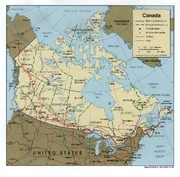
Sorry, Canada, but when the Confederacy wins, you lose.
In both Southern Victory and The Guns of the South, the Confederacy wins the American Civil War, and sometime later the United States invades Canada and occupies it. In the latter, it happens in a war which begins very shortly after the Second American Revolution. In the former, it happens during the Great War, more than 50 years after the War of Secession.
Vile France
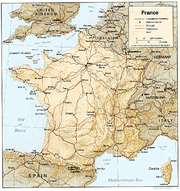
France: Harry Turtledove's bitch.
Turtledove has portrayed France negatively on any number of occasions.
- In the Atlantis Series, France is defeated in the French and Spanish War (an analogue of the Seven Years' War) and stripped of its Atlantean colonies. Yet it is later instrumental in achieving victory in the Atlantean War of Independence, a direct analog of the American Revolution which involves some of the same historical figures. In the very first chapter of "New Hastings," François Kersauzon (a Breton) indicates his willingness to share a meal with Edward Radcliffe by saying that he'd rather sit with an Englishman than a Frenchman. Later in that same novella, Richard Radcliffe's first thought on discovering the Cucumber Slug is a joke about French cuisine. In "The Scarlet Band," Englishmen Athelstan Helms and James Walton continue to make miscellaneous disparaging remarks directed at the French.
- In "Before the Beginning", France is described as turning out some of the best second-raters in the world, and its high society is implied to be quite anti-Semitic - that is, until the time-viewer's discovery puts them in their place.
- In Curious Notions, France is dealt repeated military defeats by Germany, permanently losing its influence in European and world affairs. However, Turtledove throws France a bone by suggesting that the German Emperor likes the nightlife of Paris better than his own Berlin.
- In Every Inch a King, the fantasy kingdom Narbonensis is based on France. Narbonensis is the hereditary enemy of Schlepsig, the homeland of Otto of Schlepsig, the book's only POV. Thus, in the narration, Narbonensis is repeatedly derided.
- In In High Places, France is the home of a primitive backwater civilization, and has balkanized into the nativist Kingdom of Versailles and the slightly less primitive Berber Kingdom of Berry.
- In the Presence of Mine Enemies sees France overrun and occupied Germany, and for the most part meekly puts up with this. (Possibly justified by actual history.) Even when national leaders across the world rise up to speak out against Germany in a call for reforms, the French leader is noted to be a bit more half hearted than some of the others.
- In The Man With the Iron Heart, France comes across as barely capable of administering its occupation zone. French officers are so touchy that they would rather compromise security efforts against the German Freedom Front than admit their dependence on the stronger Allied Forces members, though they do indeed rely on military and economic support from the Allies. They are also seen as treacherous, willing to play the United States and Soviet Union off against each other. Meanwhile, while some German characters acknowledge that the US, USSR, and England are entitled to attempt to occupy Germany by right of conquest, all are disgusted and outraged at being subjected to occupation by France, which Germany had defeated.
- In Ruled Britannia, France is in a very difficult geopolitical situation, as its Hapsburg enemies have encircled its territory.
- In "Someone is Stealing the Great Throne Rooms of the Galaxy," France is described as "a second-rate power on a third-rate continent on the most insignificant planet in the galaxy with a glorious future behind it," and the French are generally portrayed as a craven, contemptible people.
- In Southern Victory, France begins by supporting the Confederate States for opportunistic purposes during the War of Secession, and during the Second Mexican War is generally perceived by the Confederates as a freeloading ally, demanding political influence in Richmond and spoils of war but doing little to attack the US militarily. During the Great War France is the first of the Western members of the Entente to bow out when discipline in the ranks breaks down and the French Army Mutinies. Quebecois reflect that they feel no ties to their ancestral homeland because its government and society have become hopelessly corrupted in the century and half since the Seven Years' War. Characters in Occupied Canada remark that the Quebecois "act French", in that they indulge in sexual harassment. In the interwar years France eagerly embraces political authoritarianism and revanchism. In the Second Great War, France is soon exposed as militarily impotent but diplomatically arrogant, with its foreign minister making obscene comments on the public record. Finally, France is attacked with an atomic bomb (which is specially mentioned as decapitating the Eiffel Tower) and apparently begs for mercy immediately thereafter, suggesting a failing of national courage. At the end of the series the possibility of a French reascendance in the foreseeable future is slim to nil, nor is this seen as undesirable.
- In The Two Georges, France is the leading member in the Holy Alliance, a distasteful federation to say the least. Its representative in the North American Union, Comte Philippe Bonaparte, is an iconic caricature of a degraded, obnoxious French aristocrat. POV character Thomas Bushell regards the French language as "sounding slimy."
- In "Uncle Alf," Adolf Hitler repeatedly reflects on how disgustingly degraded the French are. (It is possible that having such a despicable character say this may be intended to make us sympathetic to the object of his scorn.)
- In The Videssos Cycle, the lone French (well, Gaulish) character, Viridovix, while portrayed heroically, has several qualities which could be viewed as distasteful, such as a willingness to side with the Roman soldiers of Marcus Aemilius Scaurus - who were his own enemies until moments ago - to save his own life, and a rather overactive libido. These are consistent with traits which Turtledove uses to show French decadence in other works.
- In the world of The War Between the Provinces, there is an unnamed nation analogous to France, and its only named citizen is called Kermit, an allusion to the insulting British custom of referring to the French as "frogs".
- In Worldwar, the French begin the story occupied by and collaborating with the Nazis. As the Race make inroads into France, the French collaborate with them as well, to the point that Leslie Groves fears they will offer to help the Lizards make chemical weapons to use against human soldiers. In Colonization, France appears equally willing to kiss the Germans' arses and, after the Race-German War of 1965, the Lizards' tailstumps - unlike most other occupied people shown in the series, who are nationalistic first and foremost even if they are willing to accommodate occupiers for their own purposes. Meanwhile, Free France is seen as something of a joke of a country which exists on international sufferance. And nearly all French characters are portrayed as bombastic, cowardly, touchy, and/or immoral, especially the male characters. The exception is the sympathetic long-suffering POV character Monique Dutourd, who is heartlessly used as a catspaw by the Nazis, the ginger mafia, the Lizards, and the Purification Squads (an analog of OTL minor collaborators who insidiously and hypocritically led "patriotic" postwar mobs to brutally punish women for sexual misdeeds), when all she wants is to be left alone to write treatises on Roman history. (Again, much of this is justified by what happened in actual history.)
It should be noted, however, that France is portrayed in a perfectly inoffensive (if not overly complimentary) light in The War That Came Early, The Disunited States of America, The Hot War, "Les Mortes d'Arthur," and "Ils ne passeront pas".
Who Needs Vichy?
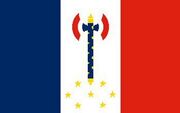
Vichy France: Who Needs It?
After Germany conquered France in OTL 1940, it directly occupied broad swaths along the northern and western coasts to its empire, but left about a third of France's territory in the southeastern corner in the hands of Vichy France, a puppet regime made up of Frenchmen who either held Fascist sympathies or were just opportunists. In both Colonization and In the Presence of Mine Enemies, Germany continues to rule France after World War II ends, and eventually dispenses with the collaborationist regime, annexing the whole of the country outright in the former.
This might or might not be in keeping with Turtledove's Francophobia, as documented in the entry above this. It is possible that the Germans found working with Frenchmen as nominal equals, even Frenchmen who were on their side, too exasperating to be worthwhile.
Washington, DC is NOT the U.S. Capital
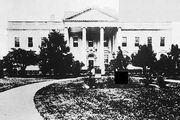
The White House, along with the rest of Washington, D.C., has been destroyed by an atomic bomb at least thrice.
For one reason or another, Washington, DC is rarely the capital of the United States in Turtledove's fiction after the point of departure. Usually, this is because DC was destroyed by an atomic bomb. In The Hot War, the capital moves to Philadelphia after DC is destroyed by the Soviet Union during the Third World War in May 1952. In In the Presence of Mine Enemies, the capital was moved to Omaha, Nebraska after DC was destroyed by Nazi Germany in another Third World War. In Colonization, the capital is moved to Little Rock, Arkansas after DC was destroyed by the Race during the alien invasion. In Southern Victory, Philadelphia becomes the de facto capital (although Washington remains the de jure capital), due to Washington's proximity to the ever-dangerous Confederate States. In "Vilcabamba", Grand Junction, Colorado is the de facto capital, as Washington (along with at least 75% of the OTL United States) is occupied by the Krolp.
West Coast Country of America
In a number of works, Turtledove has the U.S. states of California, Oregon and Washington secede from the Union and form their own country.
In "The Breaking of Nations", Turtledove's contribution to the shared work anthology After the Last Trump Sounds, the three states form the country of Pacifica in 2031 in response to the authoritarian presidency of Mike Pence. The story depicts the secession and the early days of Pacifica.
The alternate History short story "Powerless" is set in the West Coast People's Democratic Republic, a communist country modeled on the Soviet Union. While the USSR plainly prevailed in the Cold War, the history of the WCPDR isn't described in detail.
In "Manuscript Tradition", a science fiction story set in the year 2219, West Coast shares icy relations with the U.S. Its history is not examined.
The World Turned Upside Down
In both the Darkness series, which is a sorcerous analog of World War II, and The War Between the Provinces series, which is a sorcerous analog of the American Civil War, Turtledove gives his fantasy worlds a map in which the southern hemisphere is the site of the action (both wars were fought principally in the northern hemisphere), generally puts southern points in the north and vice versa so that the climate conditions will be comparable (one notable exception is the Land of the Ice People, a North Africa analog) and also reverses the maps along longitudinal axes, so that, for example, geographical areas in the southwest of the Derlavaian and Detinan maps play roles analogous to points in the northeast of the real world map.
Things
Abbreviated World Wars
The analogs of World Wars depicted by Turtledove are usually much shorter (and sometimes more destructive) than their OTL analogs. World War I lasts a matter of weeks in Curious Notions and "Uncle Alf". In Southern Victory, the Great War ends in 1917, one year earlier than the OTL WWI. In both Southern Victory and Worldwar, the second round of warfare between major powers comes to an end in 1944, one year earlier than in OTL, but with much more cavalier use of atomic bombs. Moreover, in Southern Victory, the Second Great War begins in 1941, a few years later than in OTL, where the conflicts that were folded into WWII began in 1937 in Asia and in 1939 in Europe. In Opening Atlantis: Nouveau Redon, a war similar to the Seven Years' War (a world war in all but name) appears to have started a few years later than in OTL (Turtledove was ambiguous about this), and its Atlantean theatre (which is the only aspect the novella pays attention to) lasts barely a year.
Aeroplane Lures American Fleet Into a Trap
In the Southern Victory series, enemies of the United States used military aeroplanes to lure U.S. Navy fleets into traps. During the Great War, the Japanese sent a scouting aeroplane over Pearl Harbor to lure the U.S. ships into attacking a Japanese flotilla offshore. The American ships steamed directly into the path of waiting submersibles where some attackers were torpedoed.[2] During the Second Great War, the Royal Navy sent a fighter off the Ark Royal to shoot-up a fishing boat. This lured two US carriers away from Bermuda and allowed Entente troops to land.[3]
Bad Eagle!
In OTL, the Bald Eagle is a proud national symbol of the United States of America. By contrast, in both The Two Georges and the Atlantis Series, this type of bird is referred to as being hatefully symbolic of the enemies of USA analogs.
The Battle of Volgo-Stalin-Tsaritsyn-Grad
In OTL, Stalingrad (formerly Tsaritsyn, now Volgograd) was the scene of a pitched battle in 1942-3 between Soviet and German forces. Many historians believe that the Soviet victory was the climax of the European Theater of World War II. Turtledove has repeated this theme at the exact same site in several timelines.
In American Empire: The Center Cannot Hold, we learn that the Russian socialists are making a last stand in Tsaritsyn, marking the climax of an analogous Russian Civil War. Joseph Stalin is among their leaders. This happens around 1925.
In The Disunited States of America, we learn that the critical battle of the War of the Three Emperors (possibly a loose analog of World War II) was also fought at Tsaritsyn sometime in the 1940s.
In Joe Steele, the climactic battle of World War II takes place at Trotskygrad. This is the result of the "mad libs" reassignment of national leaders and commanders in this version of WWII, which does not actually differ significantly from the OTL war until 1945.
Turtledove also patterned the Battle of Pittsburgh in Settling Accounts and the Battle of Sulingen in Darkness directly upon the Battle of Stalingrad.
Blonds as the Underclass
In three fantasy works - Darkness, The War Between the Provinces, and "None So Blind" - ethnic groups that are distinguished by their blond hair stand-in for Earth groups that have traditionally been oppressed. In the first, the Kaunians stand in for the Jews of Europe, although the past history of the Kaunian Empire seems to be based on the Roman Empire. In the second, Detinan blonds do a similar double duty, paralleling the black slaves of the United States and, to a lesser extent, the Native Americans. In the shorter work, the blond natives of a "savage" continent play out the "native bearers" cliché from fin de siècle perceptions of "Darkest Africa". In addition, both Darkness and "None" give some of the more prominent blond characters Lithuanian names.
Broken Shoe-String Awakens the Sleeping Giant
In both How Few Remain, and Days of Infamy, the United States attempts fighting its foes half-heartedly on a shoe-string budget. This ends badly for the US as it did during the Second Mexican War and the 1st Battle of the North Pacific.
After these defeats, the US then pulls out all the stops and hits back with everything they have, in both The Great War and End of the Beginning, resulting in victory in the Great War and the 2nd Battle of the North Pacific/Liberation of Hawaii.
Californian Cities Attacked by Asian Countries
In both American Empire: The Center Cannot Hold and "Getting Real", Los Angeles is attacked by an Asian power. The Japanese bomb the city in Center in the 1930s, and the Chinese attack outdated American defenses in "Getting Real." Both countries attack L.A. in order to humiliate the United States, a plan that succeeds in each story.
In Days of Infamy, Japanese forces based in Hawaii launch an aerial bombing raid on San Francisco.
Chemical Weapons in World War II Analogs
Throughout World War II in OTL, all sides adhered (except in a few isolated incidents) to the Geneva Conventions' 1929 ban on chemical weapons. By contrast, in both Worldwar and Settling Accounts, 1940s wars see the use of such weapons on the battlefield. In the former, the banned weapons are used in a measure of desperation against the Race, first by Britain, and then by Germany and other powers in short order. In the latter, no ban on such weapons was ever signed, and they are simply used as a matter of course, with some soldiers reacting in a somewhat blasé manner to them.
Destroy the Eiffel Tower!

An artist's rendition of the Eiffel Tower in...uh, Southern Victory? The Hot War? Give us a hint, Harry.
Harry Turtledove has destroyed the Eiffel Tower on several occasions, usually with Germans being the in-story culprits. In Settling Accounts: In at the Death, the Tower is melted down to a stump when Paris is destroyed by a German superbomb during the Second Great War. In The Man With the Iron Heart, post-war terrorists level the Tower with a truck bomb in 1946. In The War That Came Early, the top 50 feet of the Tower are destroyed in aerial bombings in 1939 during the titular conflict. For a change, in The Hot War, the Tower is partly melted by the Russians, who a-bomb Paris during World War III, while the rest of it falls over and crushes other buildings nearby.
...and that weatherman, too!
In Iron Heart, a weatherman falls on the Seine River along with the upper half of the tower when it is knocked down but escapes with only a broken wrist. In The War That Came Early, the upper half of the tower is destroyed by German bombers instead, and the unfortunate weatherman (if he happens to be the same) gets blown to pieces too little to fill a coffin. We can only speculate if there was also a weatherman in either Settling Accounts or The Hot War, though any remains are unlikely to be found if that was the case.
Duping Enemies To Surrender Despite Numerical Advantage
In How Few Remain, Jeb Stuart captures an American fort. He does this despite commanding a force far too small to overwhelm the US garrison through an elaborate deception: The night before, he has his men tend multiple campfires and generally create the hustle and bustle of a much larger force than they actually are. Believing himself to be outnumbered, the U.S. commander surrenders. On realizing Stuart's deception, the commander is so indignant at having been duped that he appeals to Stuart's honor to release his men and allow them to refight the battle without deceptions. Stuart declines.
In Darkness Descending, Istvan's squad encounters an Unkerlanter force of unknown number while out on patrol in the wild forests in that kingdom's western frontier. Istvan's squad's mage Kun casts a spell which amplifies the sounds of the Gyongyosian soldiers so that it sounds as though the squad is a regiment. As they approach the Unkerlanters, they hear the sounds of a brigade-level unit. Istvan is about to give up the pretense and surrender when an Unkerlanter soldier requests that Istvan accept his unit's surrender. The Unkerlanter unit was also a squad, and its number included a mage who had attempted the same trick. Despite the Unkerlanter mage casting a more ambitious spell - trying to pass a squad off as a brigade instead of a regiment - the Unkerlanters were more thoroughly deceived and were the first to surrender.
Germans Blow Up St. Paul's Cathedral in the 1940s
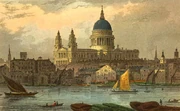
St. Paul's Cathedral: You maniacs! You keep blowing it up!
In both In the Presence of Mine Enemies and The Man With the Iron Heart, London's St. Paul's Cathedral is specifically noted as being destroyed by Germans. In the former, the Cathedral (and most of London) is destroyed by a German invasion early in World War II. In the latter, the Cathedral is destroyed by a German Freedom Front truck bomb after the OTL war. In Settling Accounts: In at the Death, London is subjected to German atomic bombing; it can be inferred that St. Paul's Cathedral was destroyed then too, but it is not specifically referred to.
A Hamlet By Any Other Name
William Shakespeare's Hamlet, arguably the best regarded and most frequently performed play in the English language, is known by other titles (an presumably has slightly different content) in The Case of the Toxic Spell Dump and Ruled Britannia. In the latter novel, where Shakespeare is one of the POVs, it is titled Prince of Denmark. In the former it is called Prosciutto and, as an additional twist, is acknowledged in-universe to be the work of Francis Bacon.
Multi-lateral Cold War
In two stories, "Ready for the Fatherland" and Colonization, the Cold War that develops after a World War II analog is fought out by several parties jostling for position. In "Ready", the Anglo-American alliance faces not only the Soviet Union, but Nazi Germany as well. In Colonization, the Race is added to that mix.
Not the Civil War
In The Guns of the South and Southern Victory, the conflict begun between the United States and the Confederate States in 1861 is not referred to as the Civil War, but by a different name following a Confederate victory: Second American Revolution and War of Secession respectively. In "Must and Shall," the Union won under different circumstances than in OTL, and the war is called the Great Rebellion.
Nuclear Free-For-All
In OTL, only the United States has used atomic bombs in war, using two against Japan in 1945. But in many Turtledove timelines, belligerents involved in major wars have traded multiple atomic weapons.
In Worldwar, the Soviet Union, Germany, and the United States swapped several atomic attacks with the Race in the year before the war ended. Subsequently, during Colonization's Race-German War of 1965 and even during peacetime, even more bombs were swapped.
In Settling Accounts: In at the Death, members of the Entente (including the Confederate States and Britain) and the Central Powers (including Germany and the United States) attacked members of the opposing alliance several times with atomic weapons before the Second Great War ended.
In the Presence of Mine Enemies had Germany and the United States use atomic bombs on each other during the Third World War.
The Valley-Westside War is set in an alternate where both sides casually used nukes during the Russian-American War in 1967, resulting in the world being set back so that most societies are barely medieval by 2097.
Not surprisingly, in The Hot War series where the Korean War escalates to a nuclear World War III between the United States and the Soviet Union, multiple cities are destroyed by atomic bombs on both sides.
The only major work where atomic weapons are not used at all is The War That Came Early. In this series, the USA's bomb project is cancelled in 1942, and no other country is revealed to be building one, although the series does end with Albert Einstein's efforts to restart the project for fear that Germany (now free of the Nazis but ruled by a military dictatorship which allows Jews to have civil rights) will begin its own a-bomb project.
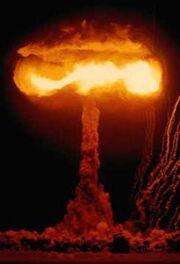
What's a few atomic bombs between friends?
Atomic Bombs Rarely Called By That Name
Atomic bombs are called by other names in some works with a pre-1945 POD. In Southern Victory, they are called "superbombs." In Worldwar, they are called "explosive-metal bombs" interchangeably with the conventional "atomic bombs." In "Ready for the Fatherland", they are called "sunbombs". In "Down in the Bottomlands" they are called "starbombs". In worlds where science and magic exist side by side, they have "mystical" names: in The Case of the Toxic Spell Dump they're "megasalamanders" and in "Birdwitching" they're "sorceries of mass destruction." The Darkness series never gives a name to its magical a-bomb analog.
Germany uses the A-bomb first...
Germany is the first country to develop and use the atomic bomb in In the Presence of Mine Enemies, Curious Notions, and Settling Accounts: In at the Death. In Worldwar it is the first human nation to deploy an atomic bomb completely using its own technology, without any material captured from the Race (the Russians previously used such a short cut).
...on the United States
In In the Presence of Mine Enemies and Curious Notions, Germany drops the first atomic bombs on the United States.
Russia Is Where the First Human-Made Atomic Bomb Is Used
In Worldwar, the Soviet Union detonates the first human-made explosive-metal bomb against the Race near Kaluga; in Settling Accounts: In at the Death, Germany uses the first superbomb against Petrograd.
The Sunbomb
"Sunbomb" is a term that describes atomic bombs in Southern Victory and "Ready for the Fatherland." In the former, the term refers specifically to the then-theoretical hydrogen bomb In the latter, it is (evidently) applied to atomic weapons generally.
Cities Destroyed by Atomic Bombs in Multiple Timelines
The following cities were the site of successful atomic bomb-attacks in at least two Turtledove timelines:
- Hamburg (Southern Victory, Worldwar)
- Los Angeles (The Hot War, The Valley-Westside War, "Half the Battle")
- Norwich, England (The Hot War, Southern Victory)
- Paris (The Hot War, Southern Victory)
- Philadelphia (In the Presence of Mine Enemies, Southern Victory)
- San Francisco (The Hot War, "The Last Word")
- Seattle (The Hot War, Worldwar)
- St. Petersburg/Petrograd/Leningrad (The Hot War, Southern Victory, The Valley-Westside War)
- Tokyo ("Ready for the Fatherland", Worldwar)
- Vladivostok (The Hot War, "Ready for the Fatherland")
- Washington, DC (The Hot War, In the Presence of Mine Enemies, Worldwar)
Multiple National Capitals Victims of Atomic Attacks
In a number of Turtledove's writings, several national capitals fall victim to damage or destruction courtesy of the atomic bomb. In The Hot War, the capitals of France (Paris), the Soviet Union (Moscow), Ukraine (Kiev), and the United States (Washington, DC are subjected to atomic bombing in World War III. In Southern Victory, the capitals of Russia (Petrograd), France (Paris), Britain (London), and the United States (Philadelphia) are subjected to superbomb attacks. In Worldwar, the capitals of Germany (Berlin), the United States (Washington), Japan (Tokyo), Italy (Rome), and Denmark (Copenhagen) are attacked during the Race Invasion of Tosev 3. During the Race-German War of 1965, Germany's new capital Nuremberg is destroyed by the Race's explosive-metal bomb, and the capitals of Romania (Bucharest) and the defunct nations of Turkey (Istanbul) and Poland (Warsaw) are destroyed by German bombs.
See Also:Places Subjected to Atomic Bombing
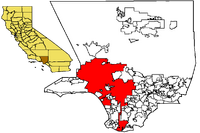
Los Angeles: Like a Phoenix From the Atomic Flame?
Post-Nuclear Societal Regression
Both "Half the Battle" and The Valley-Westside War are set in a post-nuclear Los Angeles where medieval kingdoms have sprung up fighting over small tracts of land. Another story, "Secret Names", shows Texans living as hunters and gatherers once again after a nuclear disaster.
One-State Water
On Earth, it is quite common to encounter water in both its solid and liquid states. Turtledove has twice constructed alien societies where this is not so.
- In A World of Difference, the planet Minerva is dominated by temperatures at or below the freezing point of water for most of the year, and the Minervans and other organisms of that planet have evolved to prefer ingesting solid ice to liquid water. During the summer months, water melts, though it remains quite cold by Earth standards. During particularly severe summers, Minervans sometimes resort to drinking water in its liquid form, but they find this distasteful. They use cold water for bathing and hot water as a weapon.
- In Worldwar, the Race has limited exposure to ice. Exactly how limited their exposure is, is the subject of some inconsistencies within the text. In In the Balance, as the Conquest Fleet approaches Earth and observes solid ice on the ground in the Arctic and Antarctic Circles, the Lizards reflect that on Home ice is rarely seen outside physics laboratories. In Homeward Bound, the Race acknowledges that solid water in the form of snow is a not-infrequent occurrence in the winter months in their planet's Antarctic Circle, though it does not remain on the ground year-round.
Over Here, Over Here
Analogs of World War I tear up North America as well as Europe in The Great War and The Disunited States of America.
Post-mortem potty activities
Dozens of scenes across Turtledove's oeuvre have a character die violently, followed by the narrative statement that "a sharp stench filled the room as his bowels let go in death," or "a sharp stink told [the current POV] that [the person the POV just saw die] had fouled himself," with only slight variations in the wording. Almost the exact same sentences can also be found throughout the work of Turtledove's friend and occasional writing partner S.M. Stirling.
Racial Enlightenment Not Gender Enlightenment
Turtledove has written several characters, in different stories, who call for reforms of institutionalized racial discrimination within their societies, but who, when given the opportunity to extend their belief in racial equality to matters of gender equality, fail to do so. Examples include Frederick Radcliff in Liberating Atlantis, Alva in The War Between the Provinces, and Talsu in Darkness.
A Rough 21st Century for the US Dollar
In the Crosstime Traffic Series' home timeline, "Getting Real" and In the Presence of Mine Enemies, the American dollar has been subject to severe inflation in the 21st century. In the former two stories, the US government mints small aluminum coins--worth $1 in Crosstime Traffic and $10 in "Getting Real"--which are practically worthless. In Crosstime, the most popular coin is worth $100, and a few of them just might be enough to buy lunch.
Unfortunately, the first decade of the 21st century in OTL would seem to suggest that Turtledove might be on to something.
Roman Republic in the New World
Both A Different Flesh and the Atlantis Series depict republics analogous to the United States in terms of history, but that adopt governments much more closely patterned on the Roman Republic than the actual US is. One glaring trait is the two-headed executive branch analogous to the Roman Consuls. Interestingly, the initial PODs of both timelines are in prehistory, with the "relevant" POD coming as a result of European exploration in the 15th century.
Sandwich Metal Coins? Yes Please!
In a number of post-apocalyptic worlds, Cladded US Coins (otherwise known as metal-sandwich coins) are things of wonder since the technology no longer allows for their manufacturing. In "Secret Names", shamans agreed these had magical properties and so valuable although regular people preferred older, silver coins. In "Topanga and the Chatsworth Lancers", the disaster was only thirty years old and the survivors knew it was advanced technology that made the coins, but they still had value comparable to silver coins.[4] In The Valley-Westside War, the passage of time had been greater but cladded coins were not considered magical. It was more personal preference whether one took those or silver for payment.[5]
Senior Officers Acting Like a Kid With a .22
In Southern Victory, Colonel Irving Morrell goes out on patrol by the Houston-Texas border in a command car with a mounted machine gun. He has a high time shooting up a group of Confederate gun-runners he encounters (with a reference to a kid with a .22 shooting at tin cans). During the Second Great War, General Clarence Potter has less fun shooting a machine gun in his command car at U.S. fighter-bombers attacking his brigade but General Abner Dowling does have fun doing so in Texas against holdouts in a fortified farmhouse.
In Worldwar, U.S. General Patton also had fun shooting the machine gun in his Willys MB at Lizard helicopters.
Televisors
Televisions are called "televisors" in The Two Georges, In the Presence of Mine Enemies and "The Terrific Leader". The term also appears in "The Last Word," set in a borrowed universe.
Throat-Slitting as an Act of Mercy
In several of Turtledove's military works, various soldiers (and civilian battlefield personnel such as war correspondents) have slit the throats of comrades (and enemies) who have been fatally and painfully wounded.
Time Traveling Plagiarism
In "We Haven't Got There Yet," William Shakespeare is incensed to learn that a new acting troupe is offering a play which borrows liberally from his own Hamlet. The actors, and the unseen playwright, are in fact from the late 21st century, and were transported back in time against their will.
In "Hindsight," deliberate time-traveler Michelle Gordian plagiarizes Isaac Asimov, Arthur C. Clarke, Samuel R. Delany, Robert A. Heinlein, and Larry Niven.
UK Minister of War
"Minister of War" has never been used as a title in the OTL cabinet of the United Kingdom. However, in both Southern Victory and The War That Came Early, this office is created off-stage and becomes crucial during analogs of World War II.
The Wireless

Time for Jack Benny. Turn on the wireless...er, radio, dear.
Domestic radio service (and international shortwave) is referred to as "the wireless" in Southern Victory and The Two Georges. This Briticism is understandable in a book without the American Revolutionary War (the book is filled with them) but not so understandable for American citizens to use it in a series where Great Britain is one of the USA's chief enemies.
Zeiss binoculars are the best binoculars
Worldwar, After the Downfall, The War That Came Early, and The Hot War contain passages where characters praise Zeiss for making sturdy, efficient binoculars. In the Presence of Mine Enemies shows that Zeiss has branched out into computers, and is the best computing firm in the Third Reich in the 21st century.
References
- ↑ We Install and Other Stories, p. 21
- ↑ American Front, pgs. 370-374, HC.
- ↑ Return Engagement, pg. 95.
- ↑ See eg, The Change: Tales of Downfall and Rebirth, pg. 463, HC.
- ↑ The Valley-Westside War, pgs. 138-141, HC.